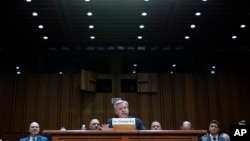A top U.S. law enforcement official is warning lawmakers that a failure to renew key surveillance authorities would amount to "unilateral disarmament" in the face of growing threats from terrorism as well as countries like China and Iran.
FBI Director Christopher Wray testified Tuesday before the Senate Judiciary Committee, urging the panel to renew the bureau's ability to gather electronic data under Section 702 of the Foreign Intelligence Surveillance Act, or FISA, before the law expires at the end of the year.
Section 702, as it is commonly known, allows agencies such as the FBI and the National Security Agency to gather electronic data of non-Americans without first obtaining a warrant. But its use has stirred controversy because of repeated incidents in which officials have collected information on U.S. citizens.
'Reckless at best...irresponsible at worst'
Wray assured lawmakers that reforms have been put in place to protect U.S. citizens, cautioning that a failure to renew the authority, or to renew the authority with additional restrictions, would put the country in danger.
"Blinding ourselves through either allowing 702 to lapse or amending it in a way that guts its effectiveness would be reckless at best and dangerous and irresponsible at worst," he said.
"The whole reason we have 702 focused on foreign threats from overseas is to protect America from those threats," he said. "It's not to admire foreign threats from afar and study them and think about them. It's to know what they are and to make sure they don't hurt Americans here."
Other U.S. officials have spent the past year briefing lawmakers about the much talked-about surveillance authority.
In May, Director of National Intelligence Avril Haines told lawmakers information gathered through Section 702 "is utterly fundamental," generating almost 60% of the information presented in the U.S. president's daily intelligence briefing.
Just months later, in July, the deputy director of the CIA, the top U.S. spy agency, told a conference outside of Washington that Section 702 has been instrumental in helping to identify Russian atrocities in Ukraine and in tracking precursor chemicals — often from China — that help fuel the production of fentanyl.
But some lawmakers have been cautious, calling for additional reforms to prevent the FBI, in particular, from obtaining information on U.S. citizens without first receiving authorization from a court in the form of a warrant.
Wray told committee members on Thursday that using Section 702 as a so-called "end run" to gather information of Americans is "expressly prohibited" and that a series of reforms has been enacted to make sure it does not happen.
He also argued that the time it would take to go through the court system to obtain a warrant could put lives in danger.
"Even though our slice of 702 as a percentage is quite narrow, that narrow slice in some ways is the most important slice, because that's what protects people here that all of us are sworn to protect," Wray argued.
"What if there were a terrorist attack that we had a shot to prevent, but couldn't take it, because the FBI was deprived of the ability under 702 to look at key information already sitting in our holdings?"
'You have a lot of gall.'
Not all lawmakers agreed the danger was so dire.
"You have the audacity to come here, and you told us adding a warrant requirement to 702 even for queries involving U.S. persons on U.S. soil, that would amount to some sort of unilateral disarmament. You have a lot of gall, sir," Republican Senator Mike Lee told Wray.
Lee also dismissed the FBI director's assurances that sufficient protections have been built in.
"We have absolutely no reason to trust you because you haven't behaved in a manner that's trustworthy," he said. "You're asking me to believe something that is not believable."
Some rights groups, such as the American Civil Liberties Union, also have balked at the renewal of Section 702 without major changes.
"We have serious, serious concerns," ACLU senior policy analyst Kia Hamadanchy told VOA last month. "Over the last 15 years, we've seen a whole host of abuses. … Our current position is that Section 702 should not be reauthorized absent fundamental reform."
Compromise possible
With time running short before the collection authority expires, there may be a chance for a compromise.
Wray told lawmakers a bipartisan proposal from the chair and vice chair of the Senate Intelligence Committee "is a path that I think merits further exploration."
The bill, proposed by Democratic Senator Mark Warner and Republican Senator Marco Rubio last week, would require the FBI to get a court order to search intelligence collected from U.S. citizens for evidence of a crime but not when it is pursuing foreign intelligence.
VOA's Rob Garver contributed to this story.





